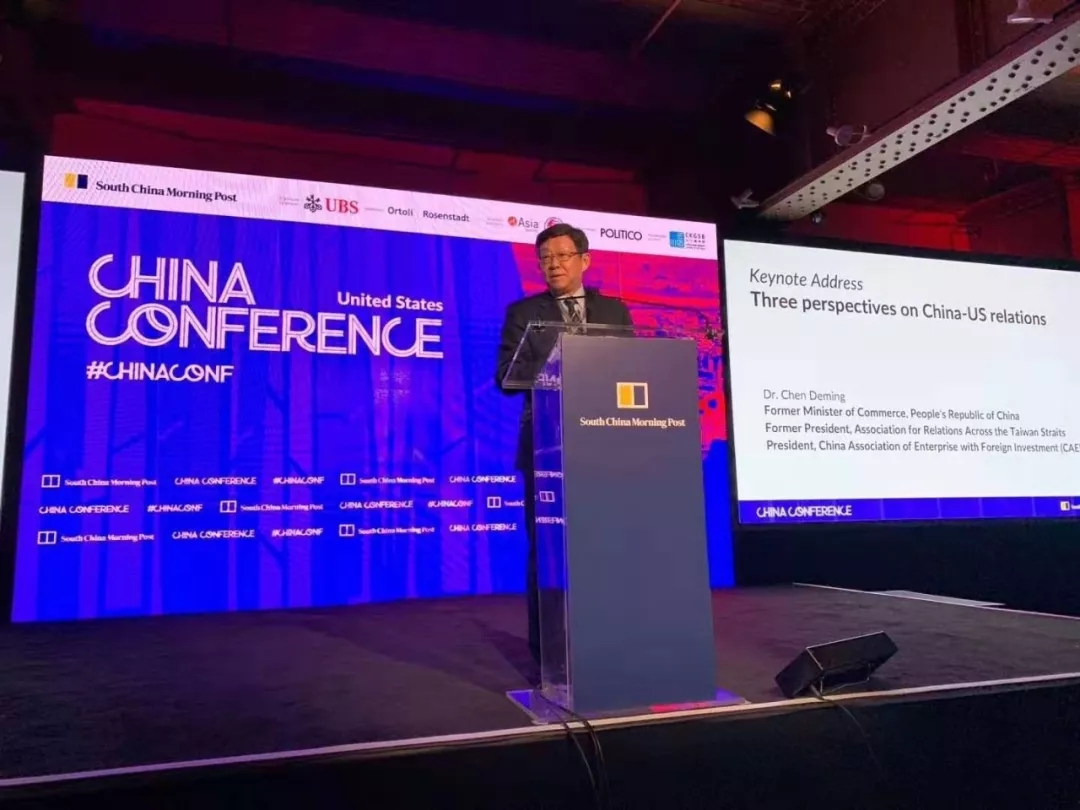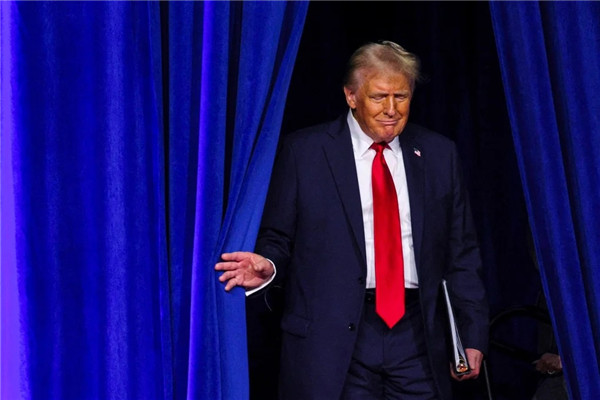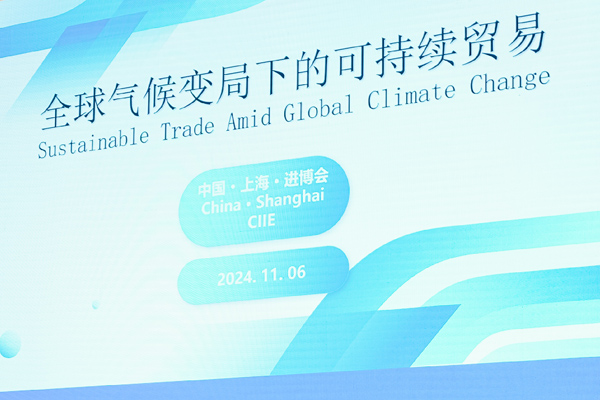China-US Relations: Cooperation “important” and Decouple “unthinkable” ——Former Minister of Commerce delivers a speech at the China Conference in New York
December 10 , 2019
On December 10, 2019, South China Morning Post hosted China Conference: United States in New York, bringing together over 350 industry experts, government officials and business leaders from the United States and China to analyze the current conflict between the two countries and profile a vision for future cooperation and competition between the world’s two biggest superpowers.
Chen Deming, former minister of Commerce of the People’s Republic of China, president of the China Association of Enterprise with Foreign Investment (CAEFI) and honorary chairman of the Center for China and Globalization (CCG), participated in the conference and gave a keynote welcome on three perspectives on the US-China relations.
Power Relations in economic globalization
Chen Deming said that international trade accounted for only 5% of global GDP before World War II. After 1995 when the World Trade Organization (WTO) was established, global trade has grown remarkably. In 2016, global trade accounted for 30% of global GDP.
Over the past decades, the international system has evolved with dominants shifts, bringing new opportunities and challenges. For example, the development of the digital economy and e-commerce was unthinkable in the past. Meanwhile, some urgent problems, such as international science and technology exchange, environmental protection and greenhouse gas emission control are also needed to be solved.
Chen pointed out that there is a need for more specific and actionable ways of formulating the rules of the multilateral trading system. The WTO indeed needs reform since it has shown a limited capacity to achieve the liberalization and facilitation that it promised. On this issue, China and the United States also reached an agreement at the G20 summit held in Argentina. China and the United States are the keys to WTO reforms.
Power Relations under the Information Technology Revolution
Chen highlighted the importance of multinational cooperation in the information age. He said that one country alone cannot solve the problems of human beings and the whole world due to the increasingly massive amount of information.
Chen said that scientists from China and the United States have co-authored thousands of papers each year, far outpacing the output from scientific collaborations between the US. and any other countries, according to a 2018 survey by academic database Nature Index. Scientific cooperation between China and the US. remains strong. He suggested that China and the US. can even cooperate in developing 6G technology based on 5G.
Chen believed that the saying of “China and the US. could disengage from each other due to the ongoing trade war” was “crazy “and “unthinkable “and he said, “go to the hell with decoupling!”
Relations between Superpowers and Emerging Powers
Chen stated that the relations between China and the US are a complicated mix of competition and cooperation, but cooperation is more important and competition should base on international competition rules.
Chen said that the US is a unique superpower in the world, but if it does not follow the rules, it will also lose competitiveness. Furthermore, the US should not attribute structural problems in its domestic development to the international system. Although China’s GDP is only about 65% of the United States’, according to the IMF, China is huge markets with great potential.
In the field of trade, China and the US have complementary advantages and share benefits. In 2018, the US was China’s largest trading partner and the sixth largest source of imports. Meanwhile, China was the United States’ largest trading partner and largest source of imports and the third largest export market.
Furthermore, 192 American companies participated in the second China International Import Expo (CIIE) hosted on November 2019, an increase of 18% over 2018, taking up the largest exhibition floor space among all participating countries and regions.
Moreover, on January 1, 2019, China’s new Foreign Investment Law will come into effect. In 2020, China will also open up the finance sector to more foreign investment. All of these indicate that China will be more open.
Look Forward a Bright Shared Future between China and the US
In the Panel discussion “Bi-polar: Can opposing ideologies coexist?”, CCG President Wang Huiyao had a conducted in-depth discussions with panelists, including Daniel Russel, vice president of International Security and Diplomacy in Asia Society Policy Institute; Ann Lee, author of “What the US Can Learn from China” and “Will China’s Economy Collapse?”, foreign policy advisor to Andrew Yang and Grace Chen, chief strategy officer of China for Live Nation. This session was chaired by Chow Chung Yan, executive editor of the South China Morning Post.
The United States and China hold different political ideologies and economic developmental mode. The future of US-China relations and their economic cooperation were the focus in this panel.
Wang pointed out, the US-China relations were tangled by too much interest, which “decoupling” is not possible. However, if the current status of China-US relations continues, there might be a vicious circle, impacting global value chains negatively. Both sides urgently need to change their minds and rebuild mutual trust, accepting the arrival of a “harmonious but different” era. He looked forward to the success of the China-US trade negotiations, and bilateral cooperation will have a bright shared future.
He Ning, former director-general of the Department of American and Oceanian Affairs in Ministry of Commerce of the People’s Republic of China (MOFCOM), former minister for trade and economic affairs of the Chinese Embassy to the United States; Li Yong, deputy director of China Association of International Trade of MOFCOM; Yang Chao, deputy director of the General Office of MOFCOM; Ding Jie, head of International Studies Research Center in Academy of Contemporary China and the World Studies(ACCWS); Victor Gao, CCG vice president; Miao Lu, CCG secretary-general and Ann Tang, CCG Deputy secretary-general also attended the forum.
About the China Conference
South China Morning Post’s China Conference was first launched in 2015 with the aim of setting the agenda for China watchers, business leaders and government officials around the world. Convening hundreds of thought-leaders at each event, renowned experts have debated pressing issues surrounding the world’s second-largest economy, and fostered better understanding and elevated thought about China’s culture, society, industries and economy. Originally held in Hong Kong, it has branched out to Southeast Asia and now the United States in the past year.






